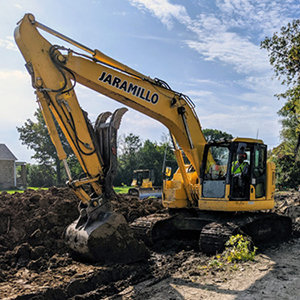Economical Lancaster Excavation - High Quality Excavation at Competitive Rates
Comprehensive Excavation Methods: Understanding the Basics for Success
The careful planning, exact implementation, and meticulous interest to detail required in excavation tasks demand a thorough strategy that incorporates different fundamental aspects. The true proficiency exists not simply in comprehending these fundamentals however in flawlessly incorporating them to browse the complexities of excavation tasks with skill.
Recognizing Excavation Job Planning

Effective excavation tasks are improved the structure of thorough and thorough planning. The preliminary stage of any excavation project is the drawing board, where essential choices are made that can significantly affect the outcome of the job. During this phase, it is vital to gather all pertinent info about the website, consisting of topographical surveys, soil structure, and any type of prospective hazards that might exist. Understanding the job extent, spending plan, and timeline restrictions is essential for creating a comprehensive excavation plan that guarantees the task's success.
One key aspect of excavation job preparation is the advancement of an in-depth timeline that outlines the sequence of tasks, due dates, and landmarks. By meticulously taking into consideration all these aspects during the planning phase, excavation jobs can be carried out successfully and efficiently, leading to effective end results - septic ohio.
Soil Evaluation and Website Evaluation
Carrying out thorough soil analysis and website assessment is an important step in the preparation phase of any excavation job. Dirt analysis entails establishing the composition, structure, and buildings of the soil at the excavation site. This info is crucial for comprehending the dirt's bearing capacity, dampness content, and possibility for erosion, which are essential factors in determining the excavation techniques and equipment needed for the task.
Site evaluation surpasses dirt evaluation and includes a wider evaluation of the total website conditions. This examination includes recognizing any kind of possible hazards, such as below ground utilities, environmental issues, or unsteady terrain, that might impact the excavation process. By completely examining the website, task managers can develop effective excavation methods that focus on security, efficiency, and ecological defense.
Making use of advanced innovations like ground-penetrating radar, dirt tasting, and drone surveys can improve the accuracy and effectiveness of soil evaluation and site evaluation. Investing time and sources in these initial actions can ultimately conserve time and prevent costly hold-ups or problems during the excavation process.
Tools Choice and Utilization
Effective excavation projects depend heavily on tactical tools option and usage to guarantee optimum efficiency and efficiency. Picking the best equipment for the work is important in making the most of efficiency and lessening downtime. Variables such as the sort of dirt, depth of excavation, and job range play a substantial function in figuring out the most ideal tools for the job at hand.

Along with picking the ideal tools, appropriate utilization is crucial to job success. Operators must be educated to take care of the equipment securely and efficiently - lancaster trenching. Normal upkeep checks and timely repair services assist stop break downs and make certain regular efficiency throughout the job
Safety Actions and Regulations Compliance
In the world of excavation jobs, prioritizing precaution and conformity with laws is extremely important to guaranteeing a safe and legally audio functional environment. Safety procedures encompass a variety of methods, consisting of carrying out comprehensive site analyses, executing appropriate signs and obstacles, and offering adequate safety training for all personnel associated with the excavation process. Adherence to policies, such as OSHA demands in the United States, makes certain that the excavation project meets the necessary requirements to protect employees, onlookers, and the surrounding environment.

Surveillance Development and Adjusting Strategies
Exactly how can project managers effectively track the improvement of excavation tasks and adapt their techniques accordingly to optimize results? Tracking progress is necessary for ensuring that excavation projects remain on track and meet target dates. Job managers can use various devices and techniques to track progress, such as day-to-day report card, regular website evaluations, and advanced tracking modern technologies like drones and GPS tracking systems. By continually keeping an eye on the job's improvement, managers can recognize any kind of prospective hold-ups or concerns at an early stage and take aggressive actions to resolve them.

Final Thought
In final thought, understanding the principles of extensive excavation techniques is crucial for the success of any task. By understanding project lancaster trenching preparation, evaluating dirt and site problems, selecting suitable devices, adhering to safety and security regulations, and keeping track of progress, project managers can guarantee a smooth and effective excavation procedure. Carrying out these techniques will lead to successful outcomes and minimize potential threats or obstacles during the excavation job.
The initial phase of any type of excavation project is the planning phase, where essential choices are made that can considerably impact the result of the project. Recognizing the job spending plan, timeline, and range restraints is essential for developing a thorough excavation plan that ensures the project's success.
Just how can predict managers effectively track the development of excavation jobs and adapt their approaches appropriately to enhance outcomes? By very closely keeping an eye on progression and being eager to adjust strategies, job managers can boost the general success of excavation jobs.
By understanding job preparation, assessing soil and website problems, picking suitable tools, conforming with safety and security laws, and monitoring progression, task supervisors can make sure a effective and smooth excavation procedure.